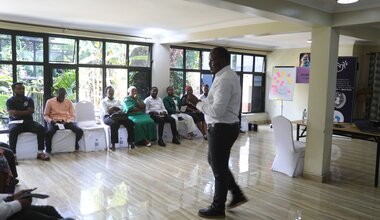Interview: General Babakar Gaye on official visit to DRC
Photo: Sylvain Liechti/MONUSCO
Lieutenant-General Babakar Gaye, Military Advisor to the United Nations Department of Peacekeeping Operations, visited the Democratic Republic of Congo (DRC) from 25 to 30 September, to meet with peacekeepers of the United Nations Organization Stabilization Mission in the DRC (MONUSCO). In the following interview given to MONUSCO's Radio Okapi, General Gaye tells us what his visit was about.
Radio Okapi: General Babakar Gaye, you just completed a mission to North and South Kivu provinces, during which you also visited Rutshuru. Could you tell us about the purpose of this mission?
General Gaye: As you may be aware, after I left the DRC, I was privileged to be appointed to serve as Military Advisor to the UN Secretary-General in New York. And it is part of my current duties to come to the field and visit the different peacekeeping missions, especially the most complex ones. If I did not come to the DRC earlier, it's because I am somewhat familiar with the situation [he served as Force Commander in this country between 2005 and 2010]. But, I decided to come today to Rutshuru to visit the Force. Let me point out that my responsibilities as Military Advisor differ from those of a Force Commander. Coming to the area of operations is, therefore, important for me to acquaint myself with the current issues and challenges, and in the process, I will be in a better position to help the Force become as effective as possible.
R.O: Following your visit, what would you say are the steps to be taken for more effectiveness?
Général Gaye: They [the troops] do not wait for my visit to do what needs to be done. I met with the different brigade commanders in Bukavu and in Goma. We discussed a range of issues, indeed everything that could be done to improve UN peacekeeping over time. This is one of my responsibilities, and one of my concerns. And we are doing it in the framework of a triangulation between the Secretariat, the Member States and our Forces that are deployed in the field.
R. O: General, what specific steps did the Brigade Commanders say should be taken for these missions to be more effective, at least at the level of the brigades?
Général Gaye: It should be well understood that the generals in command of the forces – and I was a Force Commander for five years – have full operational responsibility. These commanders do not wait for the Secretary-General's Military Advisor to come to visit before they present their problems. They present them all year round. What we can do is discuss what major concerns the Force may have for the time being and see what matters most urgently need to be addressed. In the case of MONUSCO, there are no such urgent matters. I have noted that there were projects for a good configuration of the Mission in the context of the upcoming elections. I have observed that there has been an increase in the number of unilateral operations by the Mission; that there were still joint operations with the Armed Forces of the DRC (FARDC), and that these operations were somewhat slowed down by the FARDC's project to restructure its forces into regiments. I have taken good note of all these issues.
R. O.: You have also met with the agencies of the United Nations system on an informal basis. What did they tell you exactly concerning the security situation?
Général Gaye: I met with them in Bukavu, as I used to do when I was Force Commander, and everybody said the situation has improved significantly. They also said the restructuring of the FARDC had naturally led to such an increase in human rights violations that it was urgent for the FARDC to redeploy to restore State authority.
R.O.: Thank you, General Babakar Gaye.
 UN
UN United Nations Peacekeeping
United Nations Peacekeeping





